Beginning with the 1820s, the annual Christmas issue inspired the Post‘s editors to break out in their most regal prose and use adjectives that were reserved for special guests:
“… in the depth of winter, when nature lies despoiled of every charm, and wrapped in her shroud of sleeted now, we turn for our gratification to moral sources. The dreariness and desolation of the landscape, the short gloomy days and darksome nights, while they circumscribe our wanderings, shut in our feeling also from rambling abroad, and make us more keenly disposed for the pleasures of the social circle. Our thoughts are more concentrated, our friendly sympathies more aroused. We feel more sensibly the charm of each other’s society, and are brought more closely together by dependence on each other for enjoyment. Heart calleth unto heart and we draw our pleasures from the deep wells of living kindness which lie in the quiet recess of our bosoms, and which, when resorted to, furnish forth the full element of Domestic felicity.” —Jan, 12, 1828
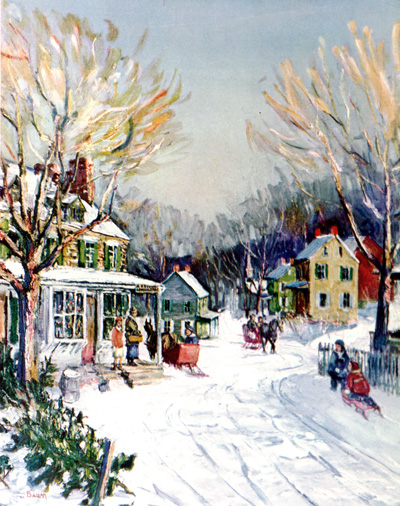
Another excerpt from that year recalls the style of Dickens, particularly the image of young dandies gawking at a passersby through lorgnettes and the passersby responding with rude faces.
“Before our next number, Christmas, the season of minced pies and merry makings — good cheer and pleasant faces, and light hearts, will have passed, and we shall be on the verge of another year. Already are our markets stocked with all manner of good things in anticipation of this joyous period, and the windows of the confectioners present a rich and gorgeous spectacle to the eye of the juvenile voluptuary. There may be seen standing in gold and purple, and standing side by side in friendly confraternity, heroes and turkey-cocks, fair ladies and glittering geese, and foppish gentlemen leering through their glasses on their neighbors jack-a-monkie, who return their civilities by a most unnatural grin.
“There are visible trees, whose green boughs are laden with fruit, richer than the golden apples of the Hesperides, or the sparkling diamonds that clustered on the branches in the wonderful cave of Aladdin.
“The elders of the family are busily prepared in making arrangements for their Christmas entertainments. The careful dame is anxiously employed in superintending the manufacture of pastry and pudding, and the younger ladies glow with the host of baking pound cake, and fruit cake — ladies fingers and jumbles [flat cakes or cookies with holes in the center, also called “jumbals”]. Natural invitations are now being exchanged, and all the charities of man’s nature break out and show themselves in kindly civilities. The heat of political excitement is forgotten — the sundered ties of friendship are reunited, and all looks smooth, and gracious and smilingly.” —Dec. 20, 1828
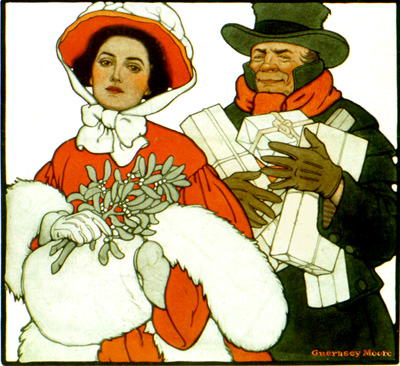
In 1817, President James Monroe made a goodwill tour of the states. The general applause that greeted him appears to have ushered in several decades of national harmony, free of the political bitterness that had recently divided the country. A Boston editor declared the country had entered “an era of good feeling.” The Post‘s Christmas editorial of 1827 certainly reflects this national sentiment of goodwill, optimism, and self-congratulation:
“On every side we discover new proofs of the excellences of our institutions, as adapted to our situations and our wants and every day furnishes evidence that nothing but our folly, or blindness to the “things that belong to our peace,” can ever shake their stability, can throw us upon the gaze of the world, their mockery and sneer, as we are now their admiration and delight…
“Is there one of all who reads this article, that can look back upon the events of the past year, and not feel that the Providence has laid His times in pleasant places, and poured out His blessing with a liberal hand.
“Thanks to the nature of our institutions, and the correct mode of thinking adopted by our citizens, wealth is not now a passport to honor… the cultivation of the human mind is the prevailing passion of this age… Elegant equipages are therefore scarcely regarded as objects of desire — our young men have only to choose between eminences in science or in art, and place their ‘mind and strength’ to the task, and they will ascend; we may therefore congratulate all, upon the existence and prospective happiness of our country, affording cause, whether we regard the blessings of the winter’s ‘fire side,’ the opening beauties of spring, the ripening effulgence of summer’s sun, or autumn’s well stored garners, to praise.” —Dec. 29, 1827
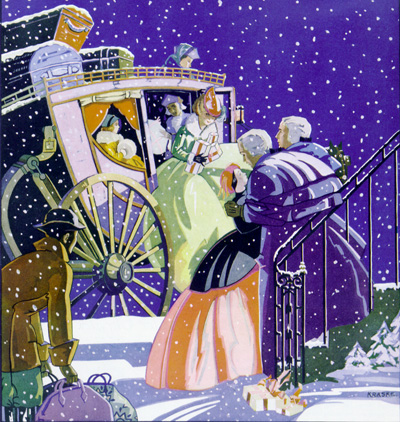
Barely three decades later, the good feeling had melted away. The Christmas editorial below, from 1856, was written in a year of guerilla raids and mass executions in Kansas, where the Civil War was being rehearsed. In their seasonal message, the editors called for the nation to look beyond the Christmas merriment and take heed of national greed, ruthlessness, and materialism.
“Leaning out, then, from the ruddy, festal glow of our private Christmas reveries and fantasies, with jovial cheer and dance and game and twinkling holly leaves behind us, let us glance at the present ways of present man, and scan the strange sceneries of the groaning globe.
“It is not a cheerful spectacle to any thinking man — this pageant of the world’s affairs. The crowds are not sane, nor the rulers just. Ghastly battle-splendors waver over the roar and whirl of events, palling that mild star which rose in history eighteen hundred years ago this Christmas Time, and deriding its benignant augury.
“Throughout Christendom the rulers are mostly bad, unscrupulous men, selfish, shallow, and malevolent, possessed with the mania of injustice, counting wealth and power as the most desirable things, quick to make wars to wrench from others gold and dominion, subtle and clever in peace to devise cheating schemes for the obtainance of the same ends, pendulums between violence and fraud, dicers in a game of blood and guile.
“What thoughtful soul can look without a sad compassion on the business in which the various nations of the earth are at present occupied, in which each is actuated by that base, prevalent, self regard! … the commercial good is almost the solitary goal of our civilization… All devices, inventions, plans, or plots, that are formed or found, are adopted with reference to the increase of wealth, the heaping up of money for the little good it is used to buy. The acquisitive passion — the “narrowing lust for gold” — is the strongest motive power in the human heart to-day…
“The world’s tale is summed up in the statement that at this season, over which stretches the golden legend of peace on earth and good will to men, the nations, Christian and barbarian alike, are engaged in covetous and rapacious wars, or are preparing to engage in such — that the stronger nations are eager to pillage and plunder the weaker — and that few men bear good will to each other whatever Heaven bears to us all. —Dec. 27, 1856
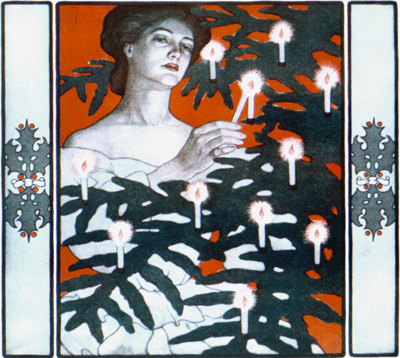
Yet one of the peculiar charms of Christmas is its ability to embrace such sermonizing alongside calls to merriment. People must celebrate, it seems, and in an age before electronic media, they proved ingenious and energetic in devising amusements.
“Among the many different games which are played at Christmas time, there is none better or more of favorite than that of Forfeits. The many resources to bring home a forfeit are illimitable, and when it is considered what merriment, what rounds of laughter some of these provoke, we sometimes wonder that this game is not played more than it is in this country.
Forfeits was played alongside other parlor games, such as word games, or charades. When a player lost or made a mistake, he or she was required to hand over “any trifling article, such as a fan, pencil-case, knife, ring, etc.”
“When the game is concluded, one of the party has to kneel down, with her head in the lap of the person holding the forfeits. This latter person holds up the forfeited articles one by one in sight of the whole company, and says ‘Here’s a very pretty thing. What’s to be done to the owner of it?’ The person kneeling down has to impose a penalty which involves some ludicrous situation, and is calculated to produce laughter and good-humor among the company present. This accomplished, the forfeited article is returned to the owner, and the next article proceeded with in a like manner.
“Of course, all vulgarity in awarding these penalties should be strictly avoided.
“It is evident that the person who has to impose the forfeits should possess a fund of humor and ready invention, and, to secure uninterrupted sport, some person should be selected who is gifted with these attributes.
“This is generally the merry time, and all are anxious to know their sentence and what they are to do to redeem their forfeited articles. To assist our young (and old?) friends we append a few.
“We will suppose the momentous question has been asked, ‘Here is a pretty thing. What shall be done to the owner?’ They may then be sentenced as follows:
• Hop round the room three times without stopping.
• Recite the alphabet backwards.
• Rub one hand on your forehead, and at the same time strike the other on the chest without changing the motion of either for an instant.
• Keep silence and preserve a serious face for five minutes whatever your companion may do to cause you to laugh.
• Kiss yourself. This is done by kissing yourself in the looking-glass.
You will notice that kissing figures prominently among the suggested forfeits.
• Say five flattering thing to the lady you love.
• Call your true love’s name up the chimney.
• Bow to the prettiest, kneel to the wittiest, and kiss the one you love best.
• Put two chairs back to back, take off your shoes, and jump over them. (The fun consists in a mistaken idea that the chairs are to be jumped over, whereas it is only the shoes!)
• Kiss the candlestick. When ordered to do so, you politely request a lady to hold the candle for you. As soon as she has it in her hand she is supposed to be the candlestick, and you, of course, kiss her.
• The Disappointment. A lady advances toward the penitent, as if to kiss him, and when close to him turns quietly around and allows the expected kiss to be taken by her nearest neighbor.
• The Old Bachelor. (For a single gentlemen.) Let the miserable being sit in the middle of the room and, while threading a needle, continue to repeat, “Oh, the inconvenience of a single life.” — Dec. 26, 1874
We offer one last look at the 19th Century Christmas party before the lights and laughter begin to fade.
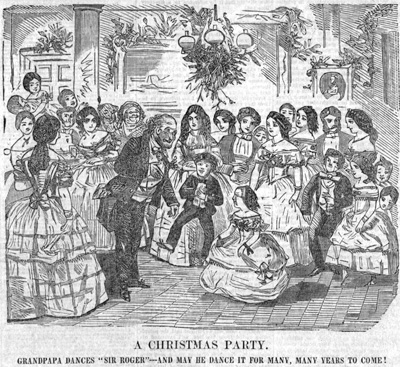 In this woodcut, Grandfather has taken to the dance floor to dance the “Sir Roger” — an English country dance named for Sir Roger de Coverly. The dancers mimic the actions of a hunted fox, as they turn, circle, duck, and return as if evading the hunting Sir Roger. They also skip down a tunnel made by other dancers’ steepled arms to mimic the fox diving in and out of its lairs. “Sir Roger” closely resembles the Virginia reel, which many remember from the movie “Gone With The Wind.”
In this woodcut, Grandfather has taken to the dance floor to dance the “Sir Roger” — an English country dance named for Sir Roger de Coverly. The dancers mimic the actions of a hunted fox, as they turn, circle, duck, and return as if evading the hunting Sir Roger. They also skip down a tunnel made by other dancers’ steepled arms to mimic the fox diving in and out of its lairs. “Sir Roger” closely resembles the Virginia reel, which many remember from the movie “Gone With The Wind.”
A favorite dance in the 1820s, it was fondly recalled as an integral part of a Christmas dance. It was the “Sir Roger” that brought Mr. and Mrs. Fezziwig to the dance floor in Dicken’s Christmas Carol, and became the high point of Scrooge’s visit to Christmas Pasts.
“A positive light appeared to issue from Fezziwig’s calves. They shone in every part of the dance like moons. You couldn’t have predicted, at any given time, what would have become of them next. And when old Fezziwig and Mrs. Fezziwig had gone all through the dance; advance and retire, both hands to your partner, bow and curtsey, corkscrew, thread-the-needle, and back again to your place; Fezziwig “cut” [made a scissor kick with his legs] — cut so deftly, that he appeared to wink with his legs, and came upon his feet again without a stagger.”
In the Post‘s cartoon above, Grandfather once again takes up the dance and revives the times of his youth to give an ageless feeling to Christmas. Like the artist, the current Post editorial staff hopes you to get a full helping of happiness this season, and that we might look forward for repeating our beloved traditions for years to come.
Become a Saturday Evening Post member and enjoy unlimited access. Subscribe now
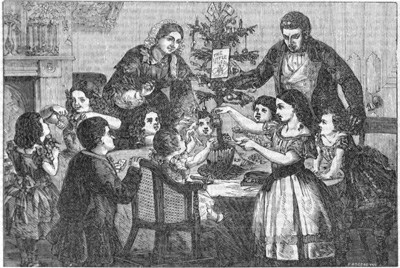


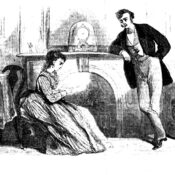
Comments
19th century Christmas times,
One hundred celebrations of
Human harmony rich in rhymes
Of earthly yearns for heaven’s love.
In such artful pictures and prose
Are flourished samplings of a past
Which went through repeat ebbs and flows.
The human condition does last.
Back then Grandfather did the dance
Called “Sir Roger” and reminisced
The old dudes like to kick and prance.
Today, Granddad shows off the Twist.
Christmas of 19th century
Reminds of joys that still can be.